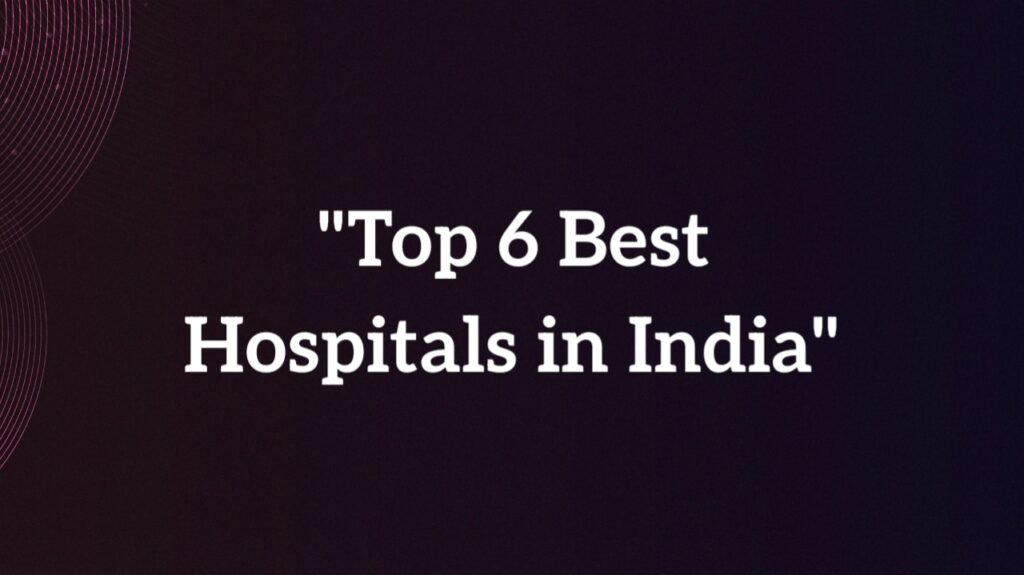India is home to some of the best healthcare facilities in the world, attracting millions of international patients each year. Whether you’re seeking treatment for a complex medical condition, undergoing surgery, or just needing routine care, choosing the right hospital is essential for ensuring the best outcomes. With so many hospitals offering a variety of services, it can be overwhelming to decide where to go for medical treatment. This comprehensive guide will help you navigate the process and choose the best hospital in India for your needs.
1. Understand Your Healthcare Needs
The first step in choosing the right hospital is understanding your specific healthcare needs. Are you looking for general healthcare services, specialized treatments, or surgery? Knowing what you require will help you narrow down the list of hospitals that offer the treatments you need.
For instance, if you need treatment for a heart condition, you would want to look for hospitals with a strong cardiology department. Similarly, if you’re seeking cancer treatment, hospitals with specialized oncology departments would be your best choice.
Key Considerations:
- General Care or Specialization?: Some hospitals are general healthcare providers, while others specialize in specific fields like cardiology, oncology, orthopedics, or neurology.
- Type of Treatment: Whether you need routine procedures, emergency care, or complex surgeries, understanding your needs will help you select a hospital with the right capabilities.
2. Research Hospital Reputation and Accreditation
When it comes to healthcare, reputation matters. You want to choose a hospital that is known for delivering high-quality care. A good way to assess a hospital’s reputation is by looking at patient reviews and feedback. Many patients share their experiences online, which can give you a glimpse of the hospital’s strengths and weaknesses.
Additionally, hospitals accredited by international organizations such as the Joint Commission International (JCI), National Accreditation Board for Hospitals & Healthcare Providers (NABH), or ISO certifications ensure that they meet global standards for patient care, safety, and quality.
Key Considerations:
- Accreditation: Look for hospitals that have JCI, NABH, or ISO certification. These accreditations indicate the hospital meets international healthcare standards.
- Patient Reviews and Testimonials: Check reviews and ratings on trusted healthcare platforms to get an idea of the hospital’s quality of care and patient satisfaction.
3. Check the Expertise of the Medical Staff
A hospital is only as good as the doctors, nurses, and other medical professionals working there. Researching the expertise and qualifications of the medical staff can significantly influence your decision. Look for hospitals that employ highly skilled and experienced doctors, particularly in the specialty you require.
Many of India’s top hospitals have internationally trained doctors who have worked in leading medical institutions across the world. You can also look at the hospital’s partnerships with universities, research institutions, or international organizations, which often signify that they are on the cutting edge of medical advancements.
Key Considerations:
- Experienced Doctors: Look for hospitals with well-known doctors in the field you’re seeking treatment for. Research their credentials, experience, and success rates.
- International Experience: Hospitals that have doctors with international exposure or affiliations often offer a higher standard of care.
4. Evaluate the Quality of Medical Facilities and Technology
The quality of a hospital’s facilities and technology plays a crucial role in the treatment process. Cutting-edge technology, advanced diagnostic tools, and modern equipment are key to diagnosing, treating, and monitoring health conditions effectively.
Top hospitals in India are equipped with the latest medical technologies, including robotic surgery systems, advanced imaging tools like MRI and CT scans, and state-of-the-art operating rooms. The availability of high-quality medical facilities can also reduce the risk of complications and improve the overall treatment experience.
Key Considerations:
- Technology: Ensure the hospital has the latest diagnostic and treatment technologies.
- Infrastructure: Look for well-maintained facilities, comfortable patient rooms, and proper sanitation.
- Emergency Services: Check if the hospital has a dedicated emergency department that can handle critical situations.
5. Consider the Location and Accessibility
The location of the hospital can significantly affect your treatment experience, especially if you need to travel for treatment or require ongoing follow-up visits. Hospitals located in major cities like Delhi, Mumbai, Chennai, and Bengaluru typically have a higher number of international patients, offering more conveniences such as transport services, visa assistance, and translator services.
If you’re an international patient, it’s important to choose a hospital that offers medical tourism services, including airport pick-up, hotel arrangements, and assistance with documentation.
Key Considerations:
- Location: Choose a hospital in a city that is easily accessible from your home country.
- Proximity to Hotels/Accommodations: Consider the availability of nearby accommodation for family members or companions traveling with you.
- Medical Tourism Support: Look for hospitals with a dedicated medical tourism department that can assist with travel arrangements and other logistics.
6. Review the Cost of Treatment
The cost of treatment is an important factor when choosing a hospital, especially for medical tourists. While medical treatments in India are significantly more affordable than in many Western countries, the cost can vary widely depending on the hospital, type of treatment, and location.
It’s essential to get an estimate of the treatment costs before making a decision. Some hospitals offer transparent pricing, while others may require a detailed consultation to provide an accurate estimate. Make sure to ask about hidden costs such as hospital stay charges, diagnostic fees, or post-treatment care.
Key Considerations:
- Cost Transparency: Ask for a breakdown of costs to avoid hidden charges.
- Insurance: Check if the hospital accepts international insurance or offers payment plans.
- Medical Packages: Some hospitals offer medical tourism packages that include treatment, accommodation, and post-surgery care.
7. Patient Support Services
When you choose a hospital, consider the level of patient support and aftercare services available. Hospitals that offer comprehensive support, such as pre-treatment consultations, counseling, and post-treatment rehabilitation, ensure a more comfortable and effective recovery process.
For international patients, it’s important to select a hospital with a dedicated patient support team that can assist with travel arrangements, language barriers, and other logistical needs.
Key Considerations:
- Pre-Treatment Consultations: Some hospitals offer online consultations to help you evaluate if their services are a good fit before you travel.
- Post-Treatment Care: Ensure the hospital has post-treatment care or rehabilitation services, especially if you require ongoing treatment.
- Language Support: Choose a hospital that provides language translation services if you’re not fluent in English or the local language.
8. Check for Medical Tourism Assistance
If you are an international patient traveling to India for treatment, look for hospitals that offer medical tourism services. These services include assistance with visa arrangements, airport transfers, hotel accommodations, and even sightseeing opportunities while you recover. Medical tourism-friendly hospitals often have a dedicated department that takes care of all aspects of your treatment journey.
Key Considerations:
- Visa Assistance: Some hospitals offer assistance with medical visa applications.
- Airport Transfer and Accommodation: Look for hospitals that provide these services, especially if you’re traveling from abroad.
- Concierge Services: Some hospitals offer concierge services for international patients, including travel planning and language support.
Conclusion
Choosing the right hospital in India is a crucial step toward ensuring a successful treatment experience. By considering factors such as your specific healthcare needs, the hospital’s reputation, medical staff expertise, technology, and patient support services, you can make an informed decision. It’s also important to evaluate the hospital’s location, cost of treatment, and any additional services they offer, especially if you are an international patient.
India offers world-class medical care, and with thorough research and careful planning, you can choose a hospital that provides the best possible care for your needs.


